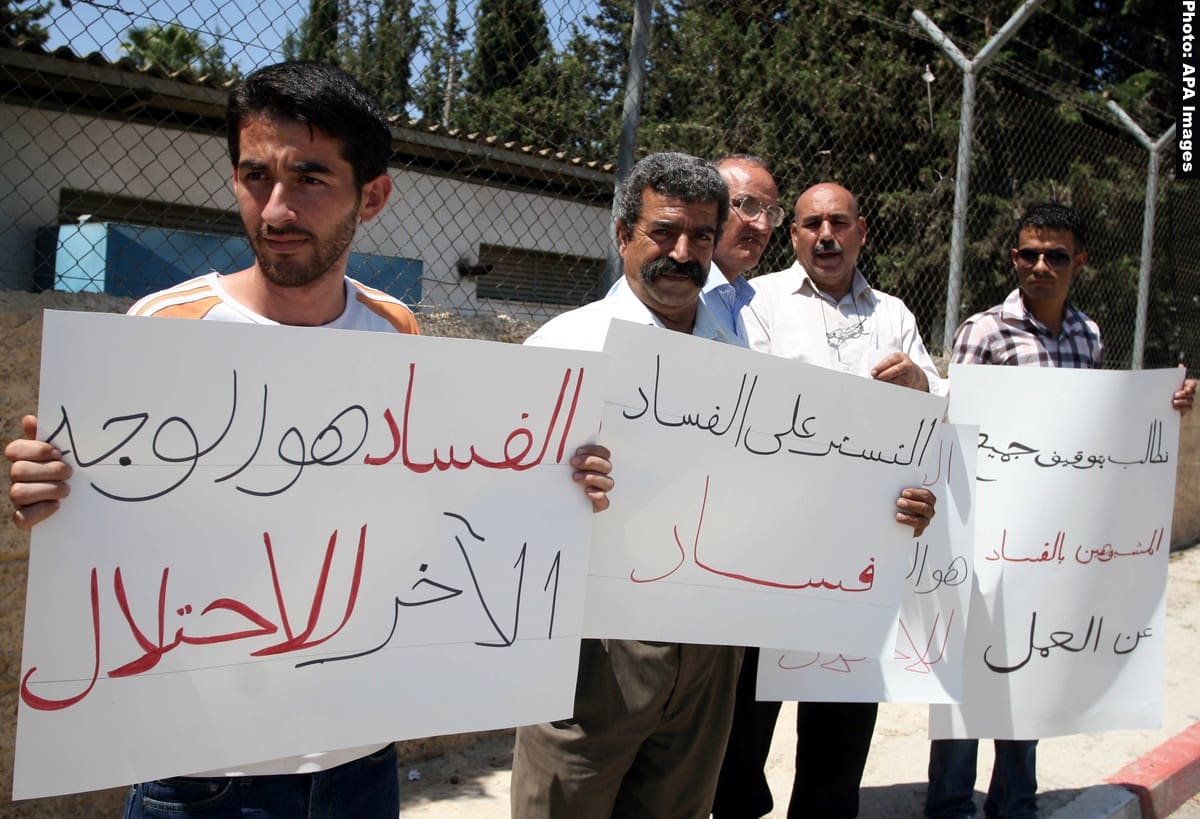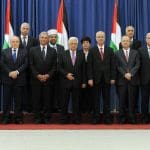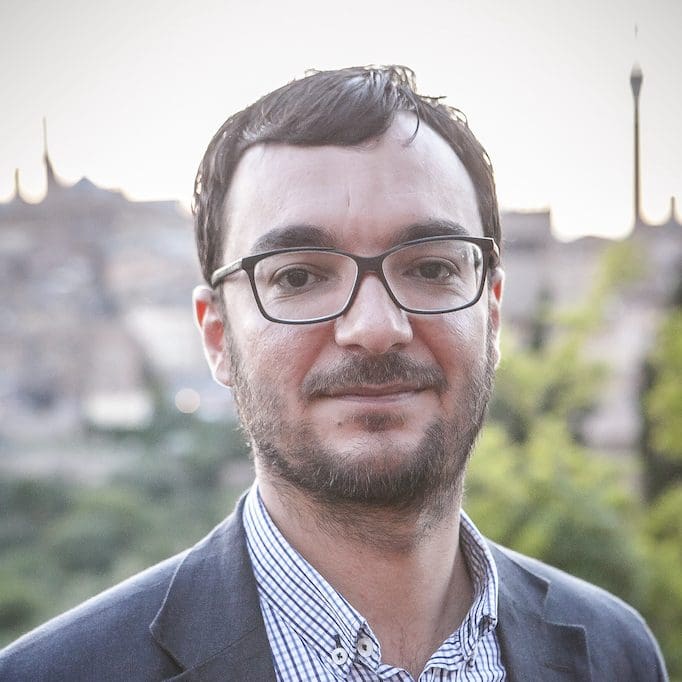
Overview
As many as 81% of the Palestinians living in the occupied Palestinian territory believe there is corruption in Palestinian Authority institutions according to a recent survey, perceptions reinforced by the recently launched annual report of the Palestinian Coalition for Accountability and Integrity (AMAN), the Transparency International chapter in Palestine. These perceptions persist despite former Prime Minister Salam Fayyad’s much-touted state-building efforts to root out corruption – and are at variance with international reports finding that suggest improvement in good governance.1
Al-Shabaka Policy Fellow Tariq Dana makes the case that corruption is structural to the Palestinian body politic and pre-dates the establishment of the Palestinian Authority. He argues that the problem needs to be tackled at its roots and cannot just be addressed through conventional measures used in other countries, particularly against the background of prolonged Israeli colonization and occupation and the way in which Israel both reinforces and exploits corruption.2
Deconstructing Corruption: The Patron-Client System
Corruption in Palestinian Authority (PA) institutions should not be perceived as merely a matter of administrative and financial wrongdoing committed by irresponsible individuals whose behavior is driven by greed and personal interests.3 The scandals that Palestinians hotly debate from time to time – such as embezzlement of public funds, misappropriation of resources, and nepotism – are an outcome of longstanding corruption embedded in the underlying power structure that governs the Palestinian political system and that were rooted in the Palestine Liberation Organization (PLO) prior to the Oslo process.
In recent years the efforts made to fight corruption have been largely “technical” in nature, and have focused on such issues as drafting codes of conduct, improving recruitment procedures, and developing preventive measures to deal with specific violations. While such measures are necessary they cannot be sufficient if the political root causes of corruption are ignored. The nature of corruption specific to the PA needs to be understood in order to be able to tackle it effectively.
PA corruption in Palestine is, in effect, a self-enforcing system. Perhaps the primary factor in reproducing and maintaining the corrupt nature of the Palestinian polity is “patron-clientelism”.4 In Palestine, patron-clientelism is rooted in the social values of kinship and familial ties, which are in turn shaped by factional politics. These social and political ties provide the ruling elite with a strategic tool to control constituents and expand the network of supporters by redistributing public resources in order to buy political loyalties, which in turn helps the ruling elite to preserve the status quo and maintain its dominance of political and economic assets.
Patron-clientelism also contributes to the climate of corruption by favoring incompetent loyal political constituents and excluding skillful people on an arbitrary basis. It thus fosters rivalry among clients who compete to demonstrate their loyalty to the ruling elite. Corruption is further reinforced because one way in which patrons reward loyal clients is by tolerating their financial malfeasance.5
Patron-clientelism has historically characterized the internal relations between the PLO executive and the national institutions and political constituents.6 The inner circle of the PLO leadership used patron-client networks on a systematic basis for multiple purposes: to extend influence over political constituents, to exclude other political forces and to implement its political agenda without opposition.
For example, during the 1980s, the PLO leadership used the Sumud (steadfastness) Fund, in the occupied Palestinian territory (OPT) – which was formally channeled through the Palestinian-Jordanian joint committee – to award their supporters and exclude others.7 This approach encouraged manipulation and monopolies and introduced corrupt practices and duplication of development projects. It also contributed to expanded client networks to serve the political projects of Fatah and the Jordanian leadership. While the stated objective of the Sumud Fund was to support the education, agriculture, health and housing sectors, in reality the main beneficiaries were “the big landlords of the Jordan Valley, the industrialists, the Jordanian civil service (in the West Bank), and professional groups who received generous housing loans.”8
After the Oslo Accords, the patron-client regime was unsurprisingly inherited by the PA and constituted the backbone of its institutional base. Instead of carrying out a merit-based institution building process, patron-clientelism became a defining feature of the PA institutional structure and a powerful tool of exclusion and inclusion. This was associated with the personalized and unaccountable style of governance of late PLO chairman Yasser Arafat and the Palestinian political leadership.9
The PA has managed to secure loyalties among constituents largely by offering access to resources for economic survival rather than by persuasion for its political, economic and social programs. In particular, the large PA public sector has been a vital instrument for creating dependency and securing loyalties. This contributed to the institutionalization of corruption in the PA public sector. In fact, this played into the hands of the Israeli government, whose intention in signing the Oslo accords was to create a client state that they could continue to control through the rents distributed to the PA via international donors, coupled with a strategy of territorial fragmentation and containment.10
The PA public sector currently employs over 165,000 civil servants who are fully dependent on salaries guaranteed by international aid to the PA. The security sector is the largest with 44% of total PA employment, and it absorbs between 30% – 35% of the PA annual budget, thus exceeding other vital sectors such as education (16%), health (9%) and agriculture (1%).
The dysfunction of the Palestinian Legislative Council (PLC) and the complete absence of legislative monitoring of the governmental budget have freed the presidency and the executive from institutional checks-and-balances and public accountability. This has bolstered executive control over public spending and the executive’s ability to control over constituents by using the stick and carrot strategy. In turn, this has enhanced irregularities and violations of employment rights.
In fact, employment in the PA public sector does not necessarily imply job security: If employees express criticism of PA policies, they are likely to be forced into early retirement, denied salary payments, or arbitrarily removed from their posts. They may also face a series of punitive measures, including denial of promotion or transfer to distant areas.
Furthermore, given that much of Palestinian society is based on tribal/clan/family social relations, the PA has sought to accommodate large families in order to ensure their loyalty. When the PA established its Ministry of Local Government, it included a special department concerned with tribal/clan affairs. The Ministry recognizes mukhtars (head of tribes/clans) and authorizes them to speak on behalf of their families. Whereas tribalism had been marginalized by the rise of the national movement, during the 1990s the PA appointed some representatives of prominent families to ministerial posts based on tribal considerations. These ministries subsequently were largely staffed with the ministers’ relatives and friends. After the state-building reforms of recent years, there was less employment based on family considerations. Instead, however, some ministers have surrounded themselves with cronies.11
The patron-client system has also been used to coopt and neutralize political opposition. Several political leaders – independents, leftists and Islamists – were incorporated into the PA project that they initially claimed to reject. They were offered privileges, advantages, and access to prestigious posts in the public in exchange for political loyalty. In fact, some of those coopted personalities have become key actors in PA politics.
The Money and Power of Elites
The corruption embedded within the Palestinian political system is best exemplified in the interplay between power and money at the highest level of political authority. This is the most prevalent form of corruption and yet it is the most difficult to trace because the elites often enjoy social, political or legal immunity. Moreover, the complexity of the way in which money changes hands and its transnational character – which can involve black markets, money laundering, and foreign bank accounts – also makes this form of corruption particularly hard to trace.
What we know about elite corruption generally comes to light in times of internal political conflicts within elite circles, when mutual accusations of large-scale embezzlement dominate news headlines. For example, Mohammed Dahlan, the former Gaza security strongman accumulated much of his wealth from monopolies over key imports to Gaza during the 1990s. After he was expelled from the Fatah Central Committee due to allegations he was planning to oust PA President Mahmoud Abbas, far more accusations of corrupt practices were made against him, such as creaming off tax revenues used for his businesses in London and Dubai.
Similarly, Mohammad Rashid, the former economic advisor to Arafat and a key ally of Dahlan’s, was sentenced in absentia for transferring millions of dollars out of the Palestinian Investment Fund and setting up fake companies. In response, Rashid revealed that Fatah had a secret bank account in Jordan that was run by the President and two of his associates. In each case, revelations of corruption are the result of a power struggle rather than serious efforts to combat corruption.
The misuse of official positions for personal gain is another facet of elite corruption. Cases that came to light included unauthorized personal use of public resources, illegal public-private deals and theft of public property. Such practices were a regular occurrence during the 1990s, and negatively impacted local and international perceptions of the PA. According to the first Palestinian audit conducted in 1997, nearly 40% of the PA budget – approximately US$ 326 million – had been misappropriated.
Despite attempts to reform the PA in recent years, there does not appear to have been substantial improvement in fighting this phenomenon. According to the 2008 AMAN report, the abuse of a public position for the misappropriation and waste of public property can be clearly seen in the allocation of state lands to individuals or firms. The AMAN 2011 report reveals the continuation of this same trend, with the waste of public funds remaining the most prominent visible form of corruption.
Another means of self-enrichment by the political elite at the expense of the rest of the population can be seen in the excessive income inequality in Palestine. The Global Gini Index pointed out the extensive inequality in income levels between high-ranking officials and the rest of the PA employees in 2013. According to recent reports, some public sector officials earn a monthly salary of more than $10,000, as well as enjoying other privileges. By contrast, two-thirds of PA public sector employees earn between $515 and $640 monthly.
Corruption Under Occupation
Israel has repeatedly contributed to and exploited corruption in the PA. It has done so in order to place the blame on the Palestinians for their economic ills and to distract attention from the devastating impact of its colonial policies on Palestinian social and economic development. Although corruption within the PA is undoubtedly harmful economically, it is worth noting that its effects are a distant second to the impact of systemic Israeli destruction of the Palestinian economy.
There are many ways in which Israel is a key actor in fostering corruption and protecting the corrupt. The public-private monopolies controlled by individuals high in the PA bureaucracy and their partners in the private sector would not have been possible without the collusion and collaboration of Israeli businesses and the consent of the Israeli political and security establishment.
Another example is Israel’s direct involvement in the so called “secret accounts” established in the 1990s by some Palestinian officials around the world, including accounts held in the Israeli Bank Leumi. Much of the money came from the taxes Israel collected on Palestinian imports, which it directly transferred to these accounts. Between 1994 and 1997, Israel is said to have transferred $125 million into these accounts; in 1997 alone, Israel reportedly transferred $400 million into Palestinian accounts in Israeli banks.12 While Israel’s role has become less visible in recent years, it still offers a safe haven for the corrupt and provides them with protection.
At the same time, Israeli propagandists actively exploit PA corruption. Israel also uses the accusations of Palestinian corruption for political gain. During the 2nd Intifada that began in September 2000, Israel used the corruption card as part of a broader strategy to get rid of Arafat and impose an externally sponsored “reform” process to suit its own agenda. In particular, Israel exploited the international preoccupation with “terrorism” by accusing Arafat of using PA resources to finance terrorism. It successfully pushed an internationally-sponsored restructuring of PA institutions, weakening Arafat through the creation of the new position of prime minister and the restructuring of the Ministry of Finance.
How Palestinians Respond to Corruption
Palestinians living under Israeli occupation believe that corruption is one of the most serious problem they face, second only to the occupation itself. A 2014 opinion poll found that 25% of Palestinians surveyed believed that corruption was a serious problem, coming second after the problem of occupation and settlements, which stood at 29% of those surveyed. Such a percentage is unsurprising, given that corruption siphons off scarce Palestinian resources and breeds a wide range of social problems, contributing to inequality and harming the social fabric, to say nothing of corrupting the struggle for national liberation and pursuit of Palestinian rights.
The first domestic challenge to PA corruption was in 1997 when the PLC released a report in the wake of the first audit cited above. The report revealed widespread corruption in the PA institutions and contained a damning indictment of all ministries.
The report was crucial as it opened the Palestinian public’s eye to the existence of systemic corrupt networks within the PA. In response, Palestinians began to mobilize and demand reforms and transparency. In 1999, 20 prominent figures, including academics, intellectuals and members of the PLC signed the “The Nation Calls Us” manifesto, which accused Arafat of “opening the doors to the opportunists to spread corruption through the Palestinian streets”. PA security forces arrested many of the signatories and accused them of threatening national unity.
By 2004, growing popular dissatisfaction with PA corruption erupted in street protests over government appointments of some notoriously corrupt personalities. Due to the increasing internal and external pressure on the PA, Arafat acknowledged that there was corruption and promised that those engaged in wrongdoing would be prosecuted.
Popular anger at corruption was also a main factor in Hamas’ overwhelming electoral victory in the 2006 parliamentary elections. For many people, Hamas offered an alternative and had earned respect for its efficient service delivery, particularly among the poorer strata of the population. However, after the formation of the Hamas-led government in 2006, it began to establish its own brand of clientelism by appointing and promoting supporters in various government posts. This contributed to the power struggle and political rivalry between Hamas and Fatah. To this day, Hamas-Fatah competition over appointments constitutes a significant impediment to the reconciliation process between the two factions. Meanwhile, Hamas’ years in power in the Gaza Strip have led the public to level similar allegations of corruption against Hamas as they have against Fatah, especially after Hamas began making massive profits from the tunnel economy between 2007 and 2014 together with a lack of transparency in dealing with the receipts.
Partially in response to public dissatisfaction, the PA founded the Palestinian Anti-Corruption Commission (PACC) in 2010. The PACC is tasked with receiving public complaints and ensuring that corruption cases are dealt with speedily and effectively. Although the PACC is portrayed as an independent commission, both financially and administratively, its chairman was appointed by presidential decree, and many of the members of the advisory board include former ministers, ambassadors and advisors to the President. Some cases of corruption have reportedly been brought to justice, but press reports as well as interviews by this author indicate that the investigations carried out are selective. Furthermore, public opinion polls indicate increased public mistrust in the PACC and a perception of systematic interference in its work by the presidency, security service and political parties.
Popular campaigns against corruption have largely diminished in recent years due in part to growing PA authoritarianism and the increasing repression of its security services. This has included blocking websites that reveal stories of widespread PA corruption.
Uprooting Corruption
This policy brief has argued that corruption in Palestinian institutions is structural and was rooted in the Palestinian political system prior to the Oslo era. Addressing corruption using technical and bureaucratic measures is not sufficient. Indeed, such measures could be counter-productive because as they could provide a smokescreen to hide the political root causes that perpetuate incentives and opportunities for corruption.
Effectively ending corruption would require a structural response that involves the entire political system. This would include an effective legislative monitoring system, institutional checks-and-balances, and an independent and well-functioning judiciary. Immunity would be withdrawn from any person, regardless of his/her position, in case of direct or indirect misuse of political power and public resources. Civil society representatives would play an effective role in monitoring public institutions and resources. In addition, the international aid industry provides a fertile field for corruption and lacks accountability. The existing aid system would need to be reformed so as to ensure it is does not help to foster corruption.
However, it is difficult to see a situation where these measures are agreed upon and implemented in the near future. Palestine is a state that has no sovereignty where people are barely surviving under a prolonged occupation nearing the 50-year mark and a siege nearing a decade. The majority of the Palestinian people remain outside Palestine, living as exiles and refugees in very difficult conditions, or as second-class citizens of Israel. Corruption has been a major contributing factor to the Palestinian national movement’s inability to achieve its objectives and now also serves the objectives of Israel’s occupation. Yet corruption will remain endemic within the PA as long as the Palestinians themselves do not begin restructuring their national institutions according to democratic principles and standards of accountability, as part of a broader strategy to pursue self-determination and Palestinian national rights, including freedom from occupation.
- Al-Shabaka publishes all its content in both English and Arabic (see Arabic text here.) To read this piece in French, please click here. Al-Shabaka is grateful for the efforts by human rights advocates to translate its pieces into French, but is not responsible for any change in meaning.
- The author thanks Al-Shabaka Program Director Alaa Tartir for his insights, feedback, and support in the preparation of this brief and the Heinrich-Böll-Foundation’s Palestine/Jordan Office for their partnership and collaboration with Al-Shabaka in Palestine. The views expressed in this policy brief are those of the author and therefore do not necessarily reflect the opinion of the Heinrich-Böll-Foundation.
- It should be noted that while neither the private or the non-governmental sectors are immune to corruption, they are not the focus on this policy brief. In addition, it should be noted that this policy brief does not cover Gaza and Hamas, although this is an important area for future study
- Patron-client relations are based on inequality whereby a patron monopolizes the centers of power and resources to contain the client within his sphere of influence. See Eisenstadt, Shmuel N., & Roniger, Luis. (1984). Patrons, clients and friends. Interpersonal relations and the structures of trust in society. Cambridge, MA: Cambridge University Press.
- Rex Brynen, The Neopatrimonial Dimension of Palestinian Politics. Journal of Palestine Studies, Vol. 25, No. 1 (1995), pp. 23-36.
- As’ad Ghanem, Palestinian Politics After Arafat: A Failed National Movement. (Indiana University Press, 2010).
- The Sumud Fund is different from Samed, the economic institution of the PLO established in 1970.
- Salim Tamari, The Palestinian Movement in Transition: Historical Reversals and the Uprising. Journal of Palestine Studies, Vol. 20, No. 2 (1991), p. 63. See also: Khalil Nakhleh, The Myth of Palestinian Development: Political Aid and Sustainable Deceit. (Jerusalem: Passia, 2004).
- Ghanem, op. cit.
- Mushtaq Husain Khan, George Giacaman and Inge Amundsen (eds.) State Formation in Palestine: Viability and Governance during a Social Transformation, (Routledge Political Economy of the Middle East and North Africa, 2004).
- Information collected in author’s interviews in Palestine in 2015.
- For further info, see: Cheryl A. Rubenberg, The Palestinians: In Search of a Just Peace. (Boulder & London: Lynne Rienner Publishers, 2003), p. 256. See also: Jamil Hilal and Mushtaq Khan, “State Formation under the PNA: Potential Outcomes and their Viability” in Khan, Mushtaq and Amundsen, Inge and Giacaman, George, (eds.), State Formation in Palestine: Viability and Governance during a Social Transformation. (London: Routledge, 2004) pp. 64-119.
Tariq Dana is Assistant Professor of Conflict and Humanitarian Studies at the Doha Institute for Graduate Studies, and an adjunct lecturer at Northwestern University in Qatar. He served as the director of the Center for Development Studies at Birzeit University and as a senior research fellow at the Ibrahim Abu-Lughod Institute of International Studies, the Graduate Institute of International and Development Studies in Geneva, and the School of Oriental and African Studies.











